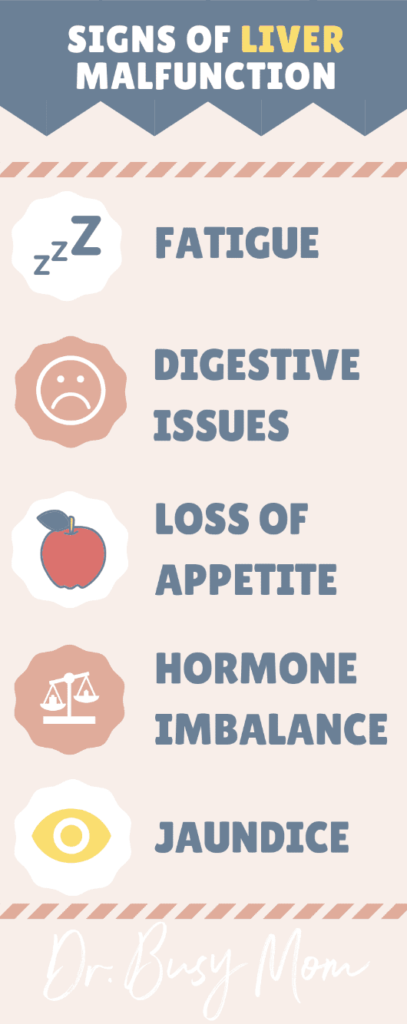From countless patients over the years I’ve heard the exact same thing, “I don’t drink alcohol so my liver is fine.” And from the folks that do casually drink alcohol I’ve heard, “I don’t drink that much alcohol so my liver can’t be the reason I feel “____” (fill in the blank). But what if I told you that the liver can simply malfunction in someone who has high amounts of stress, is regularly exposed to poor air quality, consumes processed food or has been taking prescription medication. Given our current internal and external environment, I think it’s safe to conclude that liver issues don’t necessarily occur due to alcohol consumption alone.
The Important Role of the Liver
The ultimate “multi-tasker,” your liver cleans your blood, regulates your metabolism, digestive system and blood supply. But my favorite one of all: the liver is your body’s virtual “garbage disposal.” It filters out nutrients from the foods you eat and then sends them where they are needed throughout your body (by way of the blood stream), eliminating toxins simultaneously. (1) Speaking of toxins (from the air we breathe, products we put on our skin and the foods we eat) since the liver is the main detoxification organ, it plays a significant role in the way you feel.

Common Signs and Symptoms of Liver Malfunction
Now that I’ve hopefully convinced you of the important role the liver has to your overall health, how do you correlate its function to how you feel? (you might be asking) When your liver becomes overloaded, it can begin to malfunction leaving you with a variety of symptoms. Let’s discuss some of the warning signs that you may be a candidate for a liver cleanse:
1. Fatigue
Fatigue is quite possibly the most common symptom associated with with liver dysfunction and is well documented as such. From a physiological standpoint, a malfunctioning liver can’t send signals to the brain (via neurotransmitters) leaving you “tired” due to the breakdown in communication. (2) While chronic fatigue can have many causes, I have found in my functional medicine practice that cleansing the liver with supportive neutraceuticals can significantly decrease, and in some cases eliminate fatigue.
2. Bloating and Constipation
Digestive issues are the second most common symptom of a poorly functioning liver. (3) Whether you have been on prescription medication for any length of time or have a diet rich in processed, fast or convenient food, your liver becomes overwhelmed, which in turn has an effect on your ability to digest properly. Since the liver is responsible for metabolizing protein, carbohydrates and fat, when it is not working properly bloating and constipation are common.
3. Loss of Appetite
Taking into account the digestive issues we just discussed, you can imagine that with a malfunctioning liver, where digestion is impaired, a loss of appetite is imminent. (4) The brain sends the signal to the body that you aren’t hungry in an effort to avoid additional discomfort that eating may cause.
4. Hormone Imbalance
Another job of the liver is to regulate the amount of hormones present in the blood. Since the endocrine system network of glands is excreting everything from neurotransmitters, to thyroid hormones to cortisol, estrogen, testosterone and insulin, into the bloodstream, the liver works to maintain their balance by either increasing or decreasing the levels through removal. (5) If your liver is not functioning normally, hormonal imbalance can result, leaving you with symptoms such as mood swings, irregular female cycles, and even high cholesterol.
5. Dark Yellow Urine or Skin
Jaundice, a condition of liver dysfunction, which occurs when you have abnormally high levels of bilirubin, results in subsequent dark yellow urine and skin. (6) Bilirubin builds up when your liver can’t properly metabolize blood cells as they break down.
The Next Step: Cleansing Your Liver
Now that you’ve identified you could be experiencing liver issues, either due to stress, environmental toxins, consumption of medication or poor dietary choices, the next step would be to start by removing toxic foods from your diet, like:
- Processed food
- Soda
- Fast food
- Excessive alcohol
- Foods high in refined sugar or grains
While eliminating toxic foods, begin incorporating liver friendly foods known to not only boost the health of your liver, but gently detoxify it in the process, like:
- Raw green vegetables in the form of a smoothie is by far the fastest, most delicious way to get more greens into your diet. Try my Detox Smoothie!
- Potassium-rich foods such as sweet potatoes, avocado, white beans and wild-caught salmon.
Perhaps you have already been making dietary changes and have seen some improvement in your symptoms, but are ready to take it to the next level? Try incorporating a liver-cleansing supplement. Hepaticlear is a powerhouse supplement with turmeric, milk thistle and amino acids designed to support Phase I and Phase II liver detoxification pathways. Above all, functional medicine is by far the best approach to not only restoring your liver but optimizing your overall health. To see what functional medicine can do for you, contact me HERE.



Recent Comments